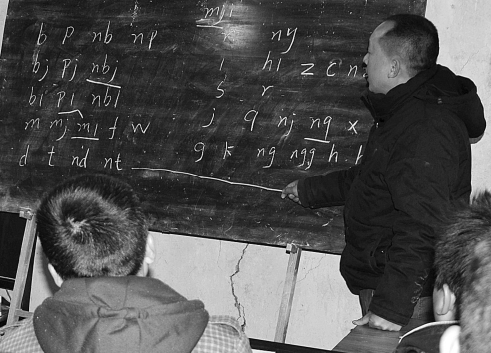
Before Yang Zhengjiang enrolled at Guizhou Minzu University in 2002, he had little idea of the rituals and traditions of his ethnic group, the Miao.
Yang was born and raised in the remote Mashan township of Guizhou's Ziyun county, where the Miao people have lived for hundreds of years without much contact with the outside world.
Yang said that during his upbringing, he spoke the language but had no idea of its written characters or of Miao literature or the folk arts found in the elders' singing or storytelling.
Curious, he decided to make it his major at the university based in Guiyang, capital of Guizhou province.

"I chose my major in the university because I love the Miao language and its precious culture. The major could help me study it in a systematic way," Yang said.
He has no regrets about his choice. On the contrary, armed with academic knowledge of the language, he has come to love the indigenous culture of his ethnic group so much that he began to teach many others after graduation.
He began to organize a work team in 2009. He taught them the Miao language's characters because using them could better record Miao culture, which is mostly in oral form. There are now 11 members on his team.
They have published books on the intangible cultural heritage of the Miao people, and they have received sponsorships from national organizations, including the Chinese Folk Literature and Art Society, to run workshops.
Yang has also brought his team to voluntarily conduct classes in the Miao language for nearby residents who are interested in Miao folk arts and want to do something to preserve and spread the ethnic group's cultural heritage.
One of the team's teachers, 40-year-old Yang Zhengxing, said, "We teach students the standard phonemic system of the Miao language to help them record the oral tradition of the group."
Yang Xiaodong, a 25-year-old student from Ziyun county, began to attend the classes in February. He said he did not understand Miao folk songs and stories before the class.
"After studying I know it is the spiritual support for our ethnic group," he added.
"What I am doing is trying my best to revive local Miao culture."
Contact the writers at lijun@chinadaily.com.cn and yangjun@chinadaily.com.cn
COURSES TAUGHT IN ETHNIC LANGUAGES
Universities in Guizhou province will introduce preparatory bilingual classes in Chinese and another ethnic language this year.
The universities are aiming to recruit some 150 students who are interested in mastering one of the ethnic group languages including Miao, Dong, Yi, Shui, Yao and Buyi, the six major ethnic groups in the southwestern province, which is home to 17 ethnic groups.
"During the preparatory year, the students will take courses in Chinese and ethnic minority languages. Then they can start their freshmen year as either a Chinese or ethnic language major," said Fan Yunlong, vice-president of Guizhou Minzu University.
Through the preparatory class, the university hopes to double the number of registered students majoring in Chinese and an ethnic minority language and literature next year, said Fan, who is in charge of the university's recruitments.
According to Fan, the university set up the bilingual major in Chinese and ethnic language and literature in 2011 in an attempt to boost the preservation of the province's various ethnic cultures.
Yang Zhengjiang teaches the language of Miao ethnic group in a classroom in Southwest China's Guizhou province. Yang, who studied the Miao language at Guizhou Minzu University, set up a work team in 2009 to teach Miao characters.